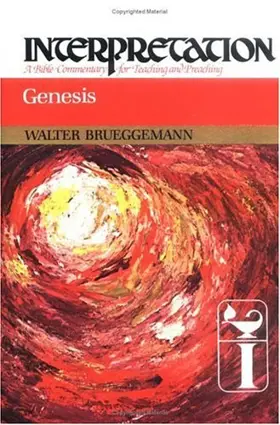

Genesis
Pages
384
Publisher
Westminster John Knox
Published
1/1/1986
ISBN-13
9780804231015
Collections
This book appears in the following featured collections.
- Top Old Testament Commentaries by Engaging Scripture (Nijay Gupta's Substack)
Reviews
Brueggemann may be the most published OT scholar today. In this early commentary, we find him at his rhetorical best, challenging the reader with the demanding message of the inscrutable yet faithful God of creation and history.
[Full Review]
I find the commentary disappointing, full of blah blah blah combined with this and that! Using Freud to help explain "the sin of Ham" was too much for me. Either I am not as smart as I need to be to understand Genesis. Or the author of the commentary is too eager to rely on intellect rather than guidance from a more supernatural source. Sorry folks. This one went to the dumpster.
Excellent work by Brueggemann here.
I do really love Brueggemann. And the content of this commentary is very solid, but the formatting is less than ideal, making it hard to find the comments on a specific item or phrase without reading the whole section. His commentary in the same series on 1 & 2 Sam. is a must have. This is helpful, worth having, but not exactly a must.
Brueggemann is a creative thinker and readers of this commentary will come across some helpful gems. But as a whole, I was disappointed by this volume. The author frequently makes assertions about the text ("there is no doubt;"; "it is generally agreed") that are unsupported and in my opinion up for a much fuller discussion than he offers. He seems to occasionally gloss over significant points that don't fit his viewpoint (for example, the consequence of death as a result of sin, p. 42). In addition to all that, he is a proponent of an exilic date for the composition of Genesis, which bothers me, but might not be an issue for others.
Although his commentary is now over 26 years old, it still speaks with a fresh voice into the situation of the modern church and society. If you read Brueggemann you should expect to receive political as well as theological insight. While I know that some can find that frustrating, I personally find it refreshingly poignant.
Brueggemann does not get bogged down in a historical reading of Genesis, but reads it as a theological document. "This story is not concerned with historical data but with the strange things which happen in the heart of God that decisively affect God's creation" (74).
This commentary is not a verse-by-verse commentary, but tackles narrative chunks. Because of that, it is very helpful when preparing for sermons of a thematic nature. It also is very well organized for a personalized reading through Genesis with Brueggemann's commentary as a beneficial guide.
I sometimes love Brueggemann's writing and would recommend one of his commentaries. Other times his writing frustrates me. And there are times his thoughts are just over my head. This commentary on Genesis has some good insights and applications which cannot be found elsewhere, but I found more often then not this commentary fell into the second category for me - frustrating. I appreciated Brueggemann's work to be applicable to our culture. But unfortunately much of his insights missed the point of the texts themselves (are we really to learn in Abraham's dialog with God over Sodom that God was in need of Abraham to teach him a better way of being just – without Abraham God was in danger of making a terribly unjust decision). This frustration runs through much of the book. One will find in this commentary much to learn, but also so much to reject. If you are looking for a good commentaries to understand the text and or provide good devotional reading, I would recommend looking elsewhere.
Brueggemann is know for challenging tradition, and this commentary is no exception. He's very passionate about a number of things, some of which will be more welcomed by those toward the leftward end of biblical interpretation. He will challenge your preconceptions about the text no matter where you stand, however, and while I don't agree with his views about the nature of scripture or with some of his political conclusions, I think it's worth a look to find insights you might not see elsewhere. Brueggemann tends to be better than most with literary observations. He always has an eye out for the practical import of the text in contemporary society.
[Full Review]
Theological reading with application.
[Full Review]



